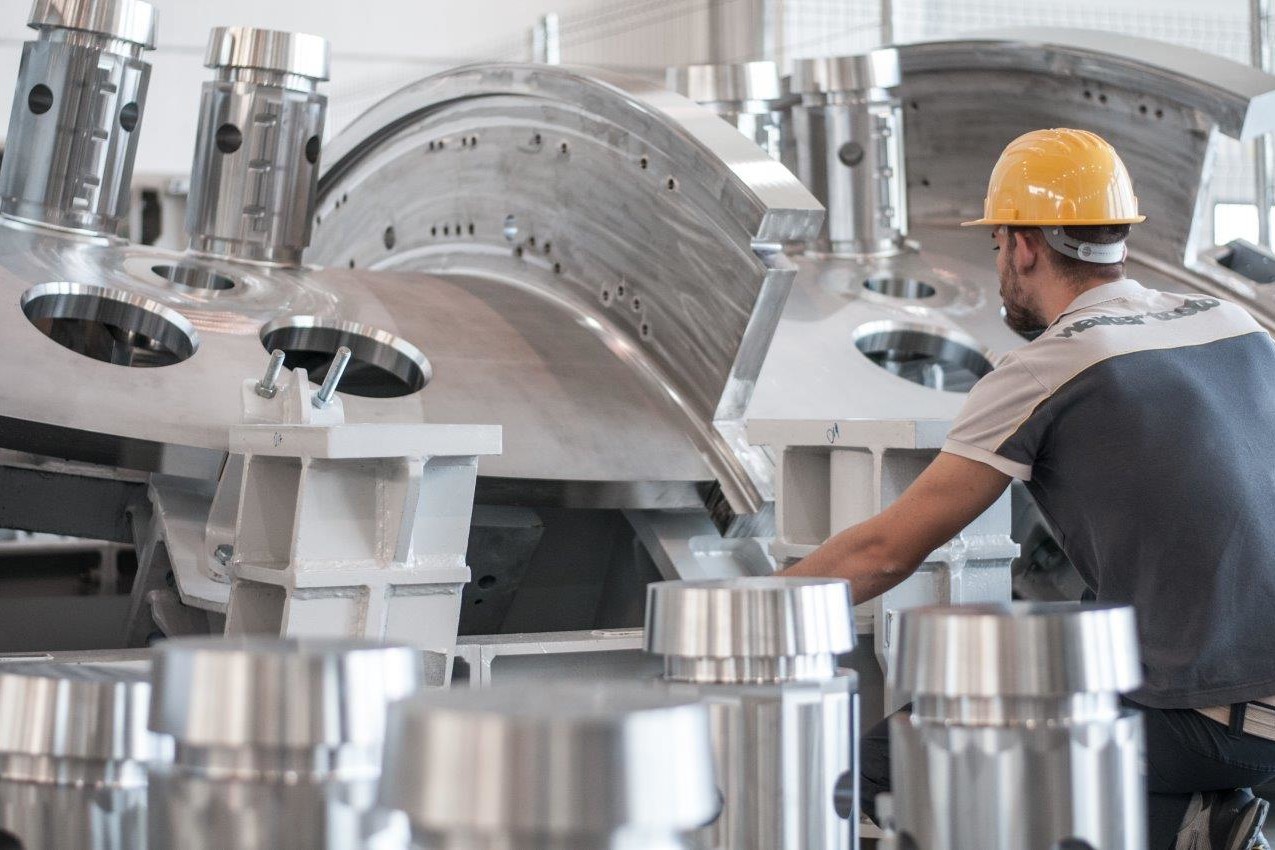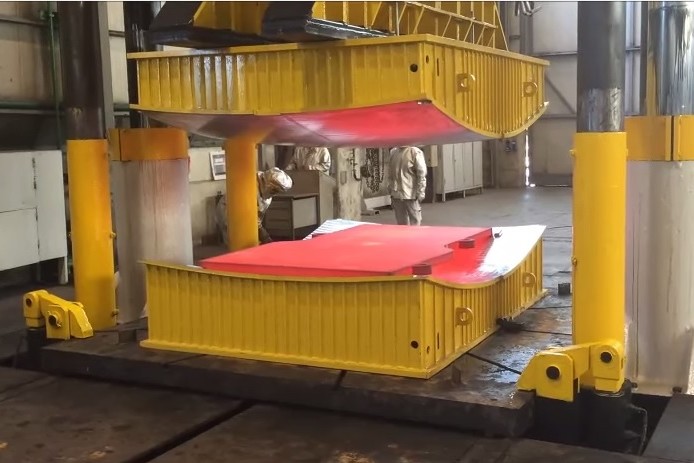Fusion 4 Energy released a very interesting interview of Max Febvre, F4E Manufacturing Project Manager for the Vacuum Vessel (Iter Nuclear Project), currently based in our facility in Chieti.
In this interview Febvre talks about the several challenges that people had to face on the production site during the difficult covid-19 situation.
He highlights the high commitment and resilience of all the team to rearrange plans and activities in order to guarantee continuity of manufacturing processes while respecting all the protocols and constraints.
“Ironically social distancing measures improved the quality of work relations. I didn’t feel any tension at work nor outside work. On the contrary, I have the impression that people were more attentive to the others and more respectful” explained Max Febvre.
“Despite the critical period, everyone helped each other and did their best to progress with the manufacturing of the first sector of the Vacuum Vessel” commented Massimiliano Tacconelli, Nuclear & Big Science Program Manager at Walter Tosto SpA, who added “I would like to thank Max for his constructive contribution, both from the human and professional point of view. I am delighted for this collaboration, paving the way to such a big project”.
Full interview
-
-
Tell us a bit about yourself. In which team you work, what are you duties, where are you based?
I’m the Manufacturing Project Manager for the Vacuum Vessel. We are a team of F4E site Project Managers and inspectors based in the five main production sites of the Vacuum Vessel in Europe (Spain, Italy and Germany). I am based in Walter Tosto, Chieti, Italy. There, I am following, supporting and reviewing the daily progress of works; inspecting all important activities to guarantee quality and conformity of work on assemblies. Together with my colleagues, and all the inspectors, we are a bit the eyes and ears of F4E in the main workshops to track progress and to guarantee conformity of that huge component which is in production.
-
Italy was one of the first countries in Europe to be severely hit by COVID-19. How did it affect you and your area of work?
For me, it was a big shock, just as it was for everyone else…particularly for my colleagues and our suppliers in Northern Italy who found themselves in the eye of the storm. There was a degree of uncertainly for a few days. We did not know if we are going to carry on working, in which conditions. We started receiving difficult questions from local inspectors and colleagues in other sites as well, about what actions we were going to take.At the time, we did not have all the answers. For example, putting in place contract conditions to allow teleworking from the inspectors’ place of assignment; reducing their presence at the workshops but guarantying the surveillance and their safety when present on-site. And we are still dealing with something severe, invisible, impossible to measure in real time. My background is in nuclear engineering and in my area there are specific protocols and tools to cope with various incidents. Here, I’m afraid we were faced with an unprecedented situation.
-
What measures were taken on-site to address the pandemic? How did your daily work routine change?
After making sense of this situation, we started analysing the decree issued by the Italian government regarding industrial activity. How would it apply from one workshop to another, would it be a case by case? Is the manufacturing of ITER components a strategic priority not to be stopped? Rapidly, we adopted social distancing measures, adopted specific rules in work. All staff had the possibility to telework, while others had the option to come to work on a strict voluntary basis. For example, masks were made compulsory to give some reassurance in the work environment. Ironically social distancing measures improved the quality of work relations. I didn’t feel any tension at work nor outside work. On the contrary, I have the impression that people were more attentive to the others and more respectful.
-
How did these measures ensure a sense of continuity? Was there any re-arrangement in the planning of activities?
As I mentioned before, there was continuity in several Vacuum Vessel manufacturing sites. We re-arranged the planning of activities, moved some critical and short term ones. We put forward a short-term plan to preserve some progress, while respecting all protocols and tackling all constraints. It felt like a strange sense of continuity…us asking our suppliers in workshops to provide some “homework” for our staff. For instance, to scan a lot of end of manufacturing documentation for review at home. Normally we do this on paper on-site.Our suppliers scanned the documentation, and we reviewed remotely from everywhere in Spain and Italy. This was a nice moment of people working together in a good spirit to deliver by bending rules.
-
What surprised you most during this period?
I think the resilience of people and their commitment. In my opinion, this is what keeps us going. It’s why people are going to work. Certainly there are other factors that come to play: where we are, where we work, are we in a safe environment? Similarly, outside work, people were very respectful and disciplined. They acted with civility, bearing the severity of the Italian Covid-19 decrees and restrictions compared to other countries.
-
Any good practice stemming from COVID-19 which will stay with us longer on-site?
Discipline, civility in work and private life will persist longer than fear, crisis and risk.
-
Italy is progressively de-escalating its measures and moving back to normality. What is the state of play now in the factory?
Most staff returned to Chieti and some other sites. A few weeks ago, the first visitors and industrial partners from Northern Italy came here. There were no hugs, but the warm, collegial spirit is there. With colleagues in Barcelona, ITER Organization and industrial partners we keep in contact via videoconferences.
-
Can you give us a quick update of the Vacuum Vessel manufacturing in COVID-19 mode?
The segments of the first sector to be delivered are now reaching their final shapes. We are dealing with inter space wall shieldings and outer shells mechanised welding. The inner shell welding of all European Sectors will be over in a few months. About electron beam welding, we are approaching the finishing line with 2.5 km of welds.
-
Share with us a lesson learnt from this unprecedented situation.
It’s too soon to share lessons learnt. I’m thinking a lot about the weakness of our global model of life, but also of our capacity to move forward if we are lucky and when we have some power and the right planning.
-
What’s the first thing you plan doing when we reach a level of normality in our daily life?
Personally, I would like to walk by the beach. Next, go to the mountains, even if the ski season is over. Later, much later, visit family scattered all over Europe.
-

 Italiano
Italiano

